大学英语语法Basic Sentence Patterns
基本句型Basic Sentence Patterns

Occasionally置于句中。
同位语(appositive)
独立成分
当两个指同一事物的句子成分放在同等位置时,一个句子成分可以用来解释另一个句子成分,前者就叫后者的同位语。两个句子成分多用名词或代词担任。语法形式相同,但功用不同,同位语置于所说名词之后。
与全句没有语法关系的句子成分叫做句子的独立成分。
Talkingmends no holes.
They weresitting before the fireplace.
(不及物动词+状语)
6主语从句或句子
Wether or not they will comedepends on the weather.
How do you do?is a greeting.
A poor manis not unnessessary unhappy.
动词及动词词组和其后续成分做谓语并决定着其后是否必须跟的成分.
His sisteris a docter.
(联系动词+主语补语)
2代词
Hehas burned the bridge behind him
The crowdedcheered.
Everyone,stand up!(呼语)
Are youtwoready?(数词)
The highway is wide and,a rare thing in thisregion,flat.
Business ,he reflected,appearedas bisk as ever.(插入语)
He wasa brute of a husband.(of短语)
The first plan,attacking at night,was turned down.(动名词)
模块1基础语法:英语五个基本句式
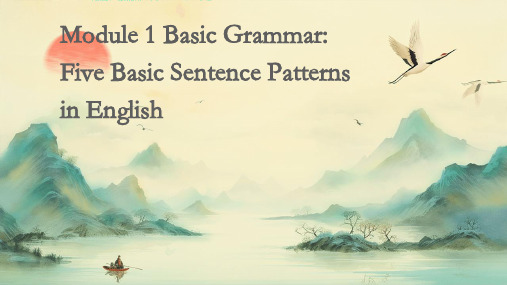
培养写作习惯
详细描述
定期进行写作练习可以帮助学习者养成良好的写作习惯。 习惯的养成有助于提高学习者的写作积极性,促使他们更 加主动地运用英语进行表达。
总结词
拓展写作风格和技巧
详细描述
通过不同类型的写作练习,学习者可以拓展自己的写作风 格和技巧。例如,写日记、故事、评论等不同类型的文章 可以帮助学习者掌握不同的写作技巧和风格,使表达更加 丰富多样。
The application of simple sentences
Simple sentences are used to express a single, complete thought, such as "I love English."
They are often used in conversation and informal
总结词
提高语言转换能力
详细描述
句子翻译练习可以帮助学习者将英文句子转换成中文,或 将中文句子转换成英文。通过这种转换,学习者可以更好 地理解两种语言的差异,提高语言转换的熟练度和准确性 。
总结词
增强跨文化交流能力
详细描述
句子翻译不仅仅是语言转换,它还涉及到文化背景的理解 和表达。通过翻译练习,学习者可以更好地了解不同文化 之间的差异,提高跨文化交流的能力。
Object-Subject-Verb Pattern
This pattern is rare in English, but still occasionally used. The object comes first, followed by the subject, and then the verb. This pattern is often used for emphasis or to show surprise.
五大基本句型(Basic Sentence Patterns)
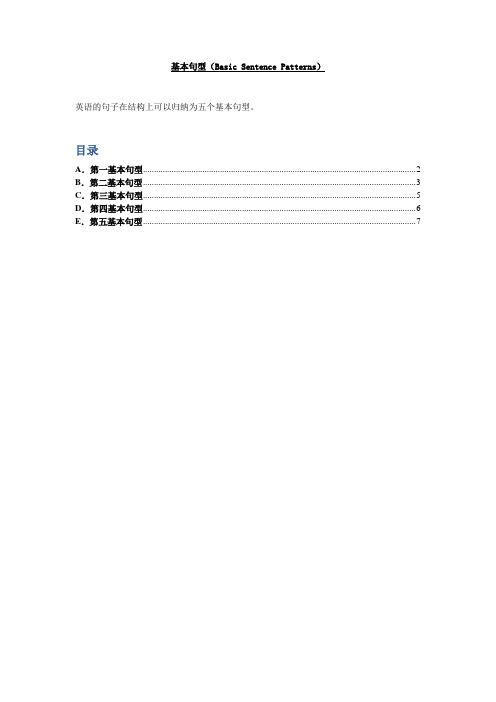
基本句型(Basic Sentence Patterns)英语的句子在结构上可以归纳为五个基本句型。
目录A.第一基本句型 (2)B.第二基本句型 (3)C.第三基本句型 (5)D.第四基本句型 (6)E.第五基本句型 (7)A.第一基本句型【例译】1.正在下着雨。
2.我的哥哥很用功。
3.我每天早晨六点钟起床。
4.日出于东而没于西。
5.比尔和吉姆每天都一起读书一起玩。
解说各例句的黑体字是主语,斜体字是谓语动词。
主语通常是一个,但是也可以如例5有两个,甚至两个以上都可以成立。
谓语动词也是一个较为普通,但是也可以如例4,5有两上,甚至更多也能成立。
本句型的Vi.属于完全不及物动词(Complete intransitive verb).注:“There + be(Vi.) + S…”也是属于第一基本句型。
例如:例:There is an alarm clock on her desk.(她的书桌上有一个闹钟。
)例:There stands a tower on the hill. (小山上耸立着一座塔。
)B.第二基本句型【例译】1.我的名字是汤姆。
2.约翰和玛丽是同班同学。
3.你准备好了吗?4.所有的问题都不容易回答。
5.你的梦想一定能实现的。
6.这些玫瑰花看起来很美,闻起来也很香。
解说各例句的黑体字是主语,斜体字是谓语动词,字底加线的是主语补语。
什么是主语补语?请观察:①My name is(我的名字是)②These roses look(这些玫瑰花看起来)上面两例虽各有可作主语的名词“name”和“roses”,也有谓语动词“is”和“look”,但是句意不清楚,无法表达完整的句意,所以不是句子。
现在若在例1之后加“Tom”,例2之后加“very beautiful”,那么句意就完整地表达出来了。
像这样,一个词(通常是n.pron.或adj.)在谓语部分里补充说明主语者就叫做主语补语。
主语补语通常是一个,但是依表达的需要也可以有两个(如例6),或更多。
英语5大基本句型!!

英语五个基本句式及句子成分(basic sentence patterns and different components )一定会有很大的帮助的!!So why not have a try?一、Different components: (各种成分)英语的句子成分跟中文的句子成分很像的,主要包括下面这些:1. 主语subject (简写S)2.谓语predicate 分为:intransitive verb (vi)/ transitive verb (vt)3. 宾语object (分为:direct object / indirect object ) (简写O)4. 宾补object complement (简写OC)5. 状语adverbial6. 表语predicative7. 定语attributive## :No matter how long the sentence is, it consists of some of these components.不管多长的句子,都是由这些成分当中的一些所构成的。
1、主语:可以作主语的成分有名词(如boy),主格代词(如you),数词(numeral),动词不定式,动名词,从句等。
主语一般在句首。
注意名词单数形式常和冠词不分家!eg: The boy comes from America. (名词作主语)He made a speech. (代词作主语)Two and two is four. (数词作主语)To be a teacher is my dream. (不定式作主语)Doing a research is a necessary step of covering a story. (动名词作主语)That he is admitted to a key university is known to us all. (从句作主语,也就是我们说的主语从句)中文里“某人做某事”做主语时,常用以下句式:to do sth To be a teacher is my dream.doing sth Teaching is his job.That/when从句That he hopes to be a teacher is known to us all.Sb’s doing sth His being a teacher makes him proud.It …… for sb to do sth It is important for us to study English well.It is no use / good doing sth It is no use crying.It …… 从句。
grammar 1 basic sentence patterns
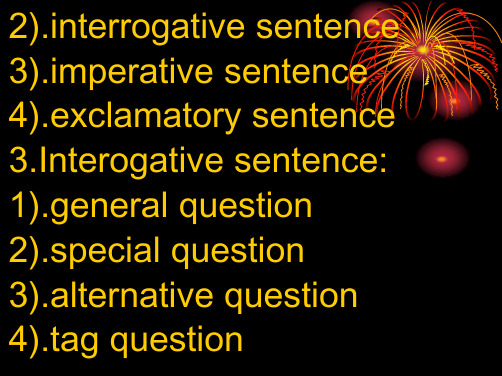
14).He was talking to his father when I saw him. 15).These workers all live near their factory. 16).The People’s Republic of China was founded on October1,1949. 17).Mr.Liang is always encouraging us to speak English both in and out of class.
Basic Sentence Patterns
Ⅰ.classification of sentences: 1.structure: 1).simple sentences 2).compound sentences 3).complex sentences es: 1).declarative sentence
1).A simple declarative sentence can be changed into all kinds of sentences. 2).You can join two simple sentences together through “and, but, ; or, for ” and get a compound sentence:
13).Mary knows something about it,____? 14).He stayed at home yesterday,____? 15).She seldom goes out on weekends,____? 16).Everyone likes to live a happy life,____? 17).I don’t believe that he has failed the English exam,____?
basicsentencestructures(1)
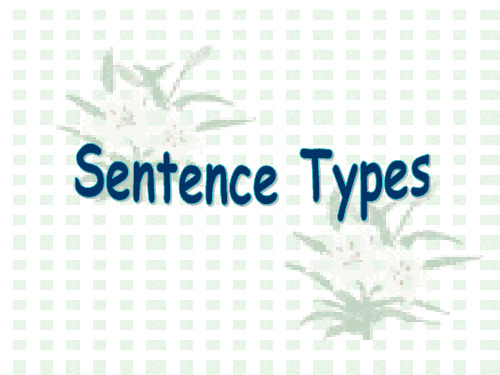
2.The following introductions might give
S. (主语)
V. (谓语动词)
you some ideas.
Oi. Od.
(间接 (直接宾语) 宾语)
The following introductions might give
you some ideas.
The following introductions might give some ideas to you.
(谓语动词)
A secretary works in an office.
S. (主语) V.
Adv.
(谓语动词) (状语)
5. A secretary also helps
the boss
S. (主语)
V.
O. (宾语)
(谓语动词)
work out plans and timetables. OC. (宾补)
today.
1. Ice cream tastes sweet. (SVC) 3
2. Walls have ears.
(SVO) 1
3. The flowers are blooming. (SV) 4
4. The mother will buy the girl a dress.
(SVOiOd) 2 5. The parents make the child do a lot
Honey is sweet, but the bee stings.
Hurry up, or you will be late.
The signal was given, and the steamer moved slowly from the dock.
basic sentence pattern
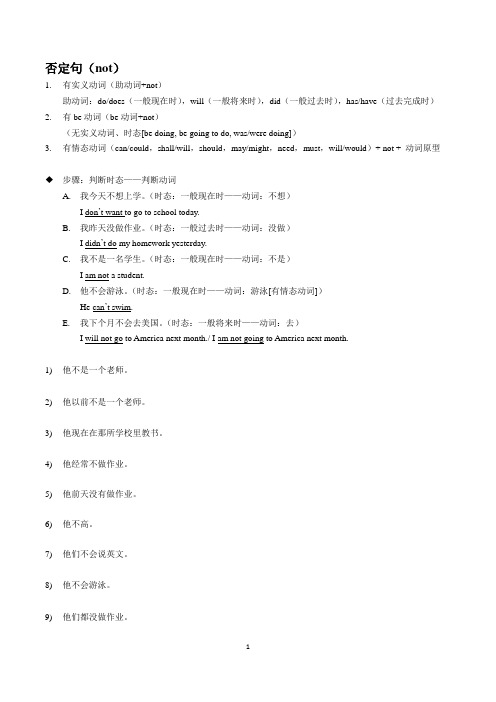
否定句(not)1.有实义动词(助动词+not)助动词:do/does(一般现在时),will(一般将来时),did(一般过去时),has/have(过去完成时)2.有be动词(be动词+not)(无实义动词、时态[be doing, be going to do, was/were doing])3.有情态动词(can/could,shall/will,should,may/might,need,must,will/would)+ not + 动词原型步骤:判断时态——判断动词A.我今天不想上学。
(时态:一般现在时——动词:不想)I don’t want to go to school today.B.我昨天没做作业。
(时态:一般过去时——动词:没做)I didn’t do my homework yesterday.C.我不是一名学生。
(时态:一般现在时——动词:不是)I am not a student.D.他不会游泳。
(时态:一般现在时——动词:游泳[有情态动词])He can’t swim.E.我下个月不会去美国。
(时态:一般将来时——动词:去)I will not go to America next month./ I am not going to America next month.1)他不是一个老师。
__________________________________________________________________________2)他以前不是一个老师。
__________________________________________________________________________3)他现在在那所学校里教书。
__________________________________________________________________________4)他经常不做作业。
Basic Sentence Patterns 英语句式

Basic Sentence PatternsPattern – 1 Subject + Intransitive verb + AdverbialsEx.1. He Sings Well2. You laughed loudlyPattern – 2 Sub + Linking verb + ComplementEx. 1. They were happy.2. She is a teacher.Pattern – 3 Sub + Transitive verb + Direct object + Adverbial1. Sachin scored a century2. He has read this book.Pattern – 4 Subject + Transitive verb + Indirect Object + Direct Object + Adverbials1. I gave my friend a present on his birthday.2. The teacher asked him a question.Exercise (Elementary)Arrange the following words in the order subject + Intransitive verb + Adverbials. Start with a capital letter and end with a full stop.1. Ravi / with a pen / writes2. in the east / the sun / rises3. The bus / late / arrived4. Ran / fast / he5. studied / in the room / children6. He / over the wall / jumped7. Heavily / it / rained8. Well / she / sings9. Laughed / loudly /He10. Rohit / there / sat11. Sanjay / loud / spoke12. The Scooter / fast /runs13. Begins / my college /in July14. Went /Home /they15. on the ice / Ravi / slippedExercise (Intermediate)Arrange the words in the order. Subject + linking verb + complements.1. Are/ busy / the boys2. tall / my brother / is3. Ravi / happy / appeared4. feel / they / annoyed5. Sad / seemed / he6. this boy / seems / restless7. smells / the rose / sweet8. bitter / this fruit / taste9. upstairs / is / my / brother10. must have been / the party / enjoyable11. were / in the library / they12. on Sunday / the examination / will be13. Mahatma Gandhi / a great leader / was14. my brother / a doctor / became15. they /quiet / remainedExercise (Intermediate)Arrange the words in the order.Subject + Transitive verb + Direct Object / Indirect object + Adverbials (if any)1. A coat / you / need2. Have started / the game / they3. the Principal / he / yesterday / met4. Scored / a century / Sachin5. my mother / a story / tells / me / every night6. The problem / carefully/ I / explained7. Football / don’t like / very much / I8. Harish / very well / English / doesn’t speak9. We / at the airport / some friends / met10. I / In bed / this morning / my break fast / had11. Ravi / last month / this picture / painted12. us / teaches / English / Mr. Sharma13. passed / John/ easily / the exam14. A lot of work / did / I / yesterday15. two / letters / I / this morning / wrote Exercise (Advanced)Write one sentence for each of the sentence patterns.1. Sub + Intransitive verb2. Subject +Liking verb + Complement3. Subject + Transitive verb + Direct object4. Subject + Transitive verb + Indirect object+ Direct object5. Subject + Transitive verb + Direct object + compliment6. Subject + Intransitive verb + Adverb7. Subject + Liking verb + Compliment8. Subject + Transitive verb + Direct object9. Subject + Transitive verb + Direct object + Indirect Object10. Subject + Transitive verb + Direct object + Compliment。
Basic Sentence Patterns
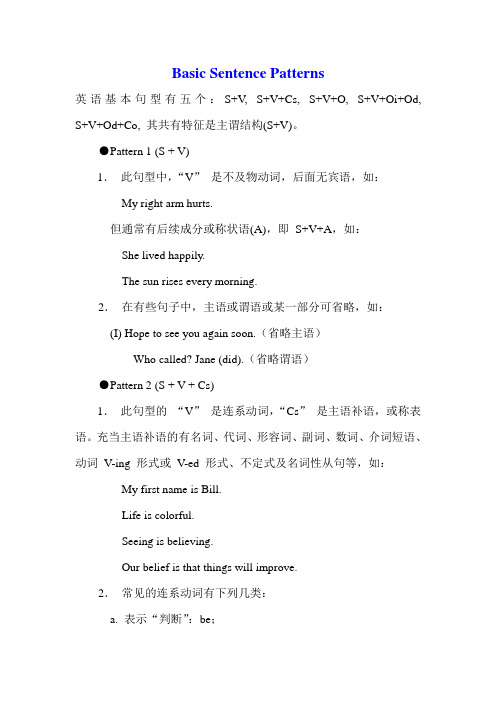
Basic Sentence Patterns英语基本句型有五个:S+V, S+V+Cs, S+V+O, S+V+Oi+Od, S+V+Od+Co, 其共有特征是主谓结构(S+V)。
●Pattern 1 (S + V)1.此句型中,“V”是不及物动词,后面无宾语,如:My right arm hurts.但通常有后续成分或称状语(A),即S+V+A,如:She lived happily.The sun rises every morning.2.在有些句子中,主语或谓语或某一部分可省略,如:(I) Hope to see you again soon.(省略主语)Who called? Jane (did).(省略谓语)●Pattern 2 (S + V + Cs)1.此句型的“V”是连系动词,“Cs”是主语补语,或称表语。
充当主语补语的有名词、代词、形容词、副词、数词、介词短语、动词V-ing 形式或V-ed 形式、不定式及名词性从句等,如:My first name is Bill.Life is colorful.Seeing is believing.Our belief is that things will improve.2.常见的连系动词有下列几类:a. 表示“判断”:be;b. 表示“变得”、“成为”:become, come, go, fall, get, grow, prove, turn 等;c. 表示“保持着某一状态”:hold, keep, lie, remain, rest, sit, stay 等;d. 表示“看起来”、“好像”:appear, look, seem 等;e. 表示“实感”:feel, sound, taste, smell 等。
e.g. She is a teacher and I am a doctor.Spring comes and all trees turn green.He stayed awake all night.You don’t look happy, what's the matter?Their plan sounds wonderful.●Pattern 3 (S + V + O)1.“V”是及物动词,后面需跟一个宾语,可充当宾语的有名词、代词、数词、不定式、V-ing 结构及名词性从句等,如:I understand the program.She asked to see the manager.Mary is considering changing her job.He said that he would call me tomorrow.2.这种结构有时必须跟状语,意义才完整(即S + V + O + A),如:We accepted their advice in buying a new car.She completed the assignment just as the bell was ringing.We don’t trust him because he often lies.You make a promise only when you know you can keep it.●Pattern 4 (S + V + Oi + Od)1.此句型的“V”称为双宾及物动词,其后需跟间接宾语“Oi”(通常指人)和直接宾语“Od”(通常指物或事)。
basicsentencepatterns解读
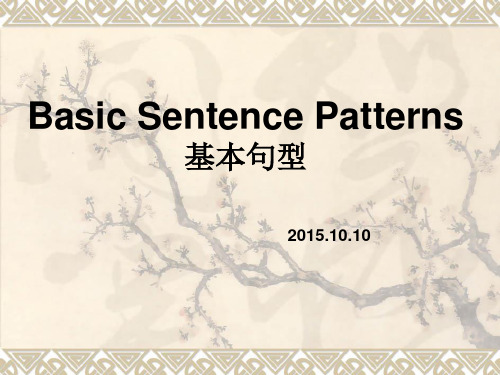
James is a football fan. He watches the World Cup every night. The games make him excited. However, the results always bring him sadness. His favorite team never wins. 主语+及物动词+宾语 Subject + Vt + Object
Tips:
若要先说出直接宾语,后说间接宾语,则要借助与介词to 或for。 e.g. The onlookers told the police the whole story. → The onlookers told the whole story to the police.
James is a football fan. He watches the World Cup every night. The games make him excited. However, the results always bring him sadness. His favorite team never wins. 主语+不及物动词 Subject + Vi
只含有一个主谓结构并且句子各成分都只由单词或短语构成的句 子叫做简单句。
The five basic structures of the Simple Sentence
1. S + V 2. S + V + P 3. S + V + O 4. S + V + IO + DO 5. S + V + O + OC 主+谓(不及物动词) 主+系+表 主+谓(及物动词)+宾 主+谓(双宾动词)+间宾+直宾 主+谓(及物动词)+宾+宾补
英语的5大基本句型_整理版

英语五个根本句式与句子成分〔basic sentence patterns and different ponents 〕一定会有很大的帮助的!!So why not have a try?一、Different ponents: 〔各种成分〕英语的句子成分跟中文的句子成分很像的,主要包括下面这些:1. 主语 subject (简写S)2.谓语 predicate 分为:intransitive verb 〔vi〕/ transitive verb (vt)3. 宾语 object (分为:direct object / indirect object ) (简写O)4. 宾补 object plement (简写OC)5. 状语adverbial6. 表语predicative7. 定语attributive## :No matter how long the sentence is, it consists of some of these ponents.不管多长的句子,都是由这些成分当中的一些所构成的。
1、主语:可以作主语的成分有名词〔如boy〕,主格代词〔如you〕,数词(numeral),动词不定式,动名词,从句等。
主语一般在句首。
注意名词单数形式常和冠词不分家!eg: The boy es from America. 〔名词作主语〕He made a speech. 〔代词作主语〕Two and two is four. 〔数词作主语〕To be a teacher is my dream.〔不定式作主语〕Doing a research is a necessary step of covering a story.〔动名词作主语〕That he is admitted to a key university is known to us all. (从句作主语,也就是我们说的主语从句)中文里“某人做某事〞做主语时,常用以下句式:to do sth To be a teacher is my dream.doing sth Teaching is his job.That/when从句 That he hopes to be a teacher is known to us all.Sb’s doing sth His being a teacher makes him proud.It …… for sb to do sth It is important for us to study English well.It is no use / good doing sth It is no use crying.It ……从句。
02 basic sentences patterns in English
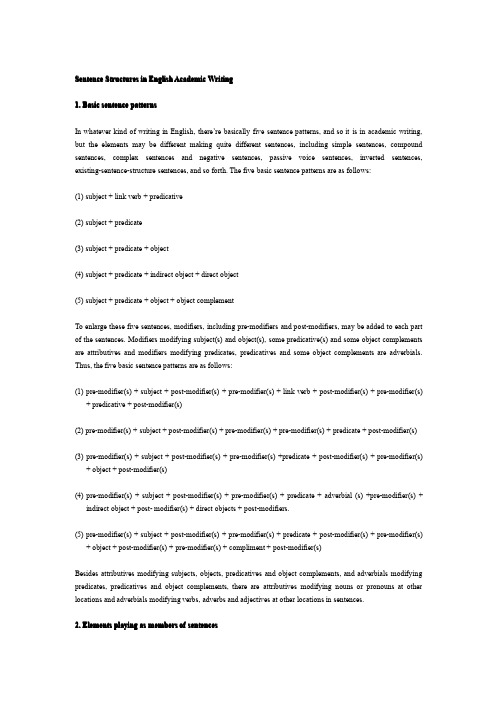
Sentence Structures in English Academic Writing1.Basic sentence patternsIn whatever kind of writing in English,there’re basically five sentence patterns,and so it is in academic writing, but the elements may be different making quite different sentences,including simple sentences,compound sentences,complex sentences and negative sentences,passive voice sentences,inverted sentences, existing-sentence-structure sentences,and so forth.The five basic sentence patterns are as follows:(1)subject+link verb+predicative(2)subject+predicate(3)subject+predicate+object(4)subject+predicate+indirect object+direct object(5)subject+predicate+object+object complementTo enlarge these five sentences,modifiers,including pre-modifiers and post-modifiers,may be added to each part of the sentences.Modifiers modifying subject(s)and object(s),some predicative(s)and some object complements are attributives and modifiers modifying predicates,predicatives and some object complements are adverbials. Thus,the five basic sentence patterns are as follows:(1)pre-modifier(s)+subject+post-modifier(s)+pre-modifier(s)+link verb+post-modifier(s)+pre-modifier(s)+predicative+post-modifier(s)(2)pre-modifier(s)+subject+post-modifier(s)+pre-modifier(s)+pre-modifier(s)+predicate+post-modifier(s)(3)pre-modifier(s)+subject+post-modifier(s)+pre-modifier(s)+predicate+post-modifier(s)+pre-modifier(s)+object+post-modifier(s)(4)pre-modifier(s)+subject+post-modifier(s)+pre-modifier(s)+predicate+adverbial(s)+pre-modifier(s)+indirect object+post-modifier(s)+direct objects+post-modifiers.(5)pre-modifier(s)+subject+post-modifier(s)+pre-modifier(s)+predicate+post-modifier(s)+pre-modifier(s)+object+post-modifier(s)+pre-modifier(s)+compliment+post-modifier(s)Besides attributives modifying subjects,objects,predicatives and object complements,and adverbials modifying predicates,predicatives and object complements,there are attributives modifying nouns or pronouns at other locations and adverbials modifying verbs,adverbs and adjectives at other locations in sentences.2.Elements playing as members of sentencesWhether in basic pattern sentences or enlarged ones,elements for same members of sentences may be different and thus leads to different structures of different sentences.(1)elements playing as subjectsElements playing as subjects or direct objects are nouns or noun phrases,pronouns,numerals,substantivized adjectives or participles,infinitives or infinitive phrases,gerunds or gerund phrases and noun clauses.(2)elements playing as predicatesElements playing as predicates are verbs(transitives or intransitives)in various forms.(3)elements playing as predicativesElements playing as predicatives are nouns or noun phrases,pronouns,gerunds or gerund phrases,infinitives or infinitive phrases,participles or participle phrases,adjectives,numerals,adverbs,prepositional phrases and noun clauses.(4)elements playing as indirect objectsElements playing as indirect objects are often nouns or pronouns denoting persons towards whom actions of finite verbs are directed.(5)elements playing as attributivesElements playing as attributives are nouns or noun phrases or nouns in possessive case,adjectives,adverbs, participles or participle phrases,numerals,pronouns,prepositional phrases,infinitives or infinitive phrases, gerunds or gerund phrases,compounds or free compounds and attributive clauses.(6)elements playing as adverbialsElements playing as adverbials are adverbs or adverbial phrases,prepositional phrases,infinitives or infinitive phrase,participles or participle phrases,nominative absolute phrases,adjectives,noun phrases(number+time or distance nouns or set expressions)and adverbial clauses.(7)elements playing as object complimentElements playing as object compliments are adjectives,nouns,infinitives,participles or participle phrases and gerunds or gerund phrases.3.Four effective members of sentences(1)AppositivesAn appositive is a word,a group of words or a clause that follows a noun or a pronoun,giving another name to the noun or pronoun it follows,defining or explaining the noun or pronoun.In function,it’s close to an attributive though it doesn’t describe its headword(the proceeding noun or pronoun).So we may change it into an attributive by adding which is called(named,defined,etc.)or who is(are,was,were)called(named,defined,etc.)between its head and itself.But as an appositive,it’s more independent and makes the sentence more concise.In different context,appositives may lay out differently–they may or may not be separated by a comma or may be or may not be placed alongside their headwords.e.g.:Professor Zhang Lin,my advisor,is in Harvard Business School now.Here,‘Zhang Lin’is an appositive of‘Professor’,not separated from its headword‘Professor’by a comma,but ‘my advisor’,an appositive of‘Professor Zhang Lin’,is separated by a comma.(2)Nominative absolute constructionA nominative absolute construction is an adjective,an adverb,a preparation phrase or a participle(present participle past participle)proceeded by a noun or pronoun.In function,it is close to an adverbial clause,telling the condition,the reason,time,circumstance,consequence,etc.of the action described by the main clause.So,we may change it into a proper adverbial clause according to the situation where it occurs.Only with nominative absolute construction is the sentence more concise and more vivid than with adverbial clause.(3)Verbless clauseA verbless clause is a clause with the omission of the verb and often the subject.A verbless clause may or may not have subordinate conjuction.The omitted subject may or may not be the subject of the main clause of the sentence. The omitted verb is often the verb“be”.The function of the verbless clause is often that of an adverbial clause and sometimes that of a relative clause.An excellent speaker,he was never at a loss for a word.--As he was an excellent speaker,he was never at a loss for a word.Negative or positive,it is the prophecy of itself.--Whether it is negative or positive,it is the prophecy of itself.If in doubt,ask me.If you are in doubt,ask me.(4)Double predicateA double predicate is a predicate made of two parts:one is a verb of full meaning which is otherwise an independent predicate and the other is an adjective or a noun which is otherwise an independent predicative.He left a child and returned a well-educated man.--He was a child when he left and a well educated man when he returned.He stood silent in the corner.--He kept silent when he stood in the corner.The moon shone bright and cold.--The moon shone and was bright and cold.4.Samples showing sentence structures in academic English(1)The market for publicly traded equity is the heart of a modern capitalist system,signaling the term on whichinvestors bear residual corporate risks.Here,‘the market for publicly traded equity’is the subject of the sentence,‘is’is the link verb,‘the heart of a modern capitalist system’is the predicative,and‘signaling the term on which investors bear residual corporate risks’is the adverbial modifying the whole sentence as adverbial of circumstances.‘for publiclyequity’’as its attributive.‘The’is a definite modifying‘market’as traded equity’is a post-modifier modifying‘equityits attributive.‘publicly traded’is a pre-modifier modifying‘equity’as its attributive.‘the’is the definite article heart’’as its attributive.‘of a modern capitalist system’is a post-modifier modifying‘heart’as its modifying‘heartpost-modifier.‘modern’and‘capitalist’and‘a’are all pre-modifiers modifying‘system’as its attributives.‘the term on which investors bear residual corporate risks’is the object of‘signaling’.‘on which investors bearterm’’residual corporate risksrisks’’is a post-modifier of‘term’as its attributive.‘the’is a pre-modifier modifying‘termbear’’the predicate of the clause,and‘residual as its attributive.‘investors’is the subject of the clause,‘bearcorporate risks’the object of the clause.‘residual’and‘corporate’are pre-modifiers modifying‘risks’as its attributives.(2)The market for newly listed firms is in turn a bellwether for the public equity market.turn’’is a Here,‘The market for newly listed firms’is the subject of the sentence.‘is is’’is the link verb.‘in turnmarket’’is the predicative of the post-modifier modifying‘is’as its adverbial.‘a bellwether for the public equity marketsentence.‘a’is an indefinite article modifying‘bellwether’as its pre-modifier.‘for the public equity market’is a preposition phrase.(3)Unraveling the complexities of those opportunities and risks can make the difference between majoropportunities and major disappointment.risks’’is a gerund phrase playing as the subject of the ‘Unraveling the complexities of those opportunities and riskssentence.‘Unraveling’is a gerund.‘the complexities of those opportunities and risks’is the object of ‘unraveling’.‘the’is the definite article modifying‘complexities’as its pre-modifier.‘of those opportunities and risks’is a preposition phrase modifying‘complexitiescomplexities’’as its attrbutive.‘those opportunities and risks’is a noun phrase playing as the prepositional object of‘of’.‘can make’is the predicate of the sentence.‘can’,a modal verb,and‘make’,a notional verb,work together forming the compound verbal predicate of the sentence.‘the difference between major opportunities and major disappointment’is the object of the sentence.‘the’is the definite article modifying‘difference’as its attributive.‘between major opportunities and major disappointment’is a preposition phrase modifying‘difference’as its attributive.‘major opportunities and major disappointment’is a noun phrase playing as the prepositional object of‘between’.(4)It is the point of entry that gives firms expanded access to equity capital,allowing them to emerge and grow.‘It is…thatthat……’is the sentence pattern forming an emphatic construction.‘the point of entry’is the subject of the sentence.‘gives’is the predicate of the sentence.‘firms’is the indirect object of the sentence.‘expanded access’is the direct object.‘to equity capital’is a preposition phrase modifying‘expanded access’as its attributive.‘equity’is a noun modifying‘capital’as its attributive.‘allowing them to emerge and grow’is the adverbial of circumstances,playing as the adverbial of the sentence.‘allowing’is a present participle.‘them’is the indirect object of‘allowing’.‘to emerge and grow’is the direct object of‘allowing’.(5)Examining the characteristics of newly listed firms can provide interesting information about changes throughtime in the kinds of firms that are viable candidates for public equity financing.firm’’is a gerund phrase playing as the subject of the sentence.‘Examining the characteristics of newly listed firm‘the characteristics of newly listed firms’is the object of the gerund‘Examining’.‘newly listed’is a past participle playing as the pre-modifier of‘firm’as its attributive.‘newly’is an adverb modifying‘listed’as its adverbial.‘newly listed firm’is a noun phrase playing as the prepositional object of‘of’.‘can provide’is the compound verbal predicate of the sentence consisting of modal verb‘can’and notional verb‘provide’.‘interesting information about changes through time in the kinds of firms that are viable candidates for public equity financing’is the object of the sentence.‘interesting’is an adjective modifying‘information’as its attributive.‘about changes through time in the kinds of firms that are viable candidates for public equity financing’is a preposition phrase modifying‘information’as its attributive.‘Changes’is a noun playing as a prepositional object of‘about’.‘through time’is a preposition phrase modifying‘changes’as its attributive.‘in the kinds of firms that are viable candidates for public equity financing’is a preposition phrase modifying ‘changes’as its attributive.‘of firms that are viable candidates for public equity financing’is a preposition phrase modifying‘kinds’as its attributive.‘that are viable candidates for public equity financing’is an attributive clause modifying‘firms’.‘for public equity financing’is a preposition phrase modifying‘candidates’as its attributive.‘public equity’is a noun phrase modifying‘financing’as its attributive.‘public’is an adjective modifying‘equity’.(6)Section5describes the case for a classical-Sraffian model as the appropriate benchmark model for macrotheorizing,while section6considers the status of some key conventional policy wisdoms in the light of this alternative benchmark model.‘Section5’is a noun phrase consisting a noun‘section’and a numeral‘5’playing as the subject of the sentence.‘describes’is a notional verb playing as the predicate of the sentence.‘the case for a classical-Sraffian model as the appropriate benchmark model for macro theorizing’is the object of the sentence.‘for a classical-Sraffian model as the appropriate benchmark model for macro theorizing’is a preposition phrase modifying‘case’as its attributive.‘classical-Sraffian’is a compound adjective modifying‘model’.‘as the appropriate benchmark model for macro theorizing’is a preposition phrase modifying‘model’as its attributive.‘appropriate’is an adjective modifying‘model’as its attributive.‘benchmark’is a noun modifying‘model’as its attributive.‘for macro theorizing’is a preposition phrase modifying‘model’as its attributive.‘while section6considers the status of some key conventional policy wisdoms in the light of this alternative benchmark model’is an adverbial clause playing as an adverbial of the sentence as the adverbial of contrast.‘Section6’is the subject of the adverbial clause.‘considers’is the predicate of the clause.‘the status of some key conventional policy wisdoms’is the object of the adverbial clause.‘of some key conventional policy wisdoms’is preposition phrase modifying‘status’as its attributive.‘in the light of this alternative benchmark model’is an preposition phraseplaying as adverbial of the adverbial clause.(7)But the real sea change in China’s importance has occurred only in the past few years,as China has begun toimplement its World Trade Organization accession obligations,and the country has stood out so sharply as the only rapidly growing major economy in the world.‘But’is a coordinate conjunction,indicating here the relationship of coordination with the sentence above.‘the real sea change in ChinaChina’’s importance’is the subject of the sentence.‘has occurred’is the predicate of the sentence.‘only in the past few years’is the adverbial of the sentence as adverbial of time.‘only’is an adverb modifying‘in the past few years’as its adverbial.‘as China has begun to implement its World Trade Organization accession obligations’is an adverbial clause of time indicating time of‘has occurred’.‘and the country has stood out so sharply as the only rapidly growing major economy in the world’is a coordinateChina’’s importance has occurred only in the past few years,as China has clause of‘the real sea change in Chinabegun to implement its World Trade Organization accession obligation’,indicating the coordinate relationship between them.‘country’is the subject of the clause.‘has stood out’is a verbal phrase playing as the predicate of the clause.‘so sharply’is the adverbial of manner modifying‘has stood out’.‘so’is an adverb modifying ‘sharply’as its adverbial.‘as the only rapidly growing major economy in the world’is a preposition phrase modifying‘has stood out’as its adverbial of manner.‘only’is an adjective modifying‘economy’as its attributive.‘rapidly growing’is a present participle phrase modifying‘economy’as its attributive.‘major’is an adjective modifying‘economy’as its attributive.‘in the world’is a preposition phrase modifying‘economy’as its attributive.(8)These issues are part of the broader debate over the distribution of the costs and benefits of globalization,which has been defined by Fisher(2003,p.3)in his Ely Lecture to the American Economic Association as‘the ongoing process of greater economic interdependence among countries,reflected in the increasing amount of cross-border trade in goods and services,the increasing volume of international financial flows and increasing flows of labour’.‘These issues’is the subject of the sentence.‘are’is the link verb linking the subject and the predicate.“part of the broader debate over the distribution of the costs and benefits of globalization,which has been defined by Fisher(2003,p.3)in his Ely Lecture to the American Economic Association as‘the ongoing process of greater economic interdependence among countries,reflected in the increasing amount of cross-border trade in goods and services,the increasing volume of international financial flows and increasing flows of labour’”is the predicative of the sentence.‘part’is the headword of the predicative.‘of the broader debate over the distribution of the costs and benefits of globalization’is a preposition phrase modifying‘part’as its attributive.‘over the distribution of the costs and benefits of globalization’is a preposition phrase modifying ‘debate’as its attributive.‘of the costs and benefits of globalization’is a preposition phrase modifying ‘distribution’as its attributive.‘of globalization’is a preposition phrase modifying the noun phrase‘costs and benefits’as its attributive.“which has been defined by Fisher(2003,p.3)in his Ely Lecture to the American Economic Association as‘the ongoing process of greater economic interdependence among countries’”is an attributive clause modifying‘distribution’as its attributive.‘reflected in the increasing amount of cross-border trade in goods and services’is a past participle phrase modifying‘process’as its attributive.‘the increasing volume of international financial flows and increasing flows of labour’is an appositive of‘the increasing amount of cross-border trade in goods and services’.(9)The emerging consensus that openness to trade is good for economic growth,based on studies such as Sachs and Warner (1995)and Frankel and Romer (1999),has come under recent challenge from a series of papers that have argued the importance,and in some cases the dominance,of ‘governance’,or ‘institutional quality’,or ‘social infrastructure’as determinants of economic development.‘The emerging consensus that openness to trade is good for economic growth,based on studies such as Sachs and Warner (1995)and Frankel and Romer (1999)’is the subject of the sentence.‘that openness to trade is good for economic growth ’is a noun clause playing as the appositive of ‘consensus ’.‘based on studies such as Sachs and Warner (1995)and Frankel and Romer (1999)’is a past participle phrase modifying ‘consensus ’as its attributive.‘such as Sachs and Warner (1995)and Frankel and Romer (1999)’is a preposition phrase modifying ‘studies ’as its attributive.‘has come ’is the predicate of the sentence.“under recent challenge from aseries of papers that have argued the importance,and in some cases the dominance,of ‘governance governance’’,or ‘institutional quality quality’’,or ‘social infrastructure infrastructure’’as determinants of economic development ”is a preposition phrase playing as an adverbial of ‘has come ’.‘from a series of papers ’is a preposition phrase modifying ‘challenge ’as its attributive.“that have argued the importance,and in some cases the dominance,of‘governance governance’’,or ‘institutional quality quality’’,or ‘social infrastructure infrastructure’’as determinants of economic development ”is an attributive clause modifying ‘papers ’as its attributive.‘that ’is the subject of the attributive clause.‘have argued ’is the predicate of the attributive clause.‘the importance ’and ‘the dominance ’are coordinative objects of the attributive clause.‘in some cases ’is a preposition phrase playing as a modifying adverbial of ‘and ’.“of ‘governance ’,or ‘institutional quality quality’’,or ‘social infrastructure infrastructure’’”is a preposition phrase modifying ‘importance ’and ‘dominance ’as their attributive.“‘governance governance’’,or ‘institutional quality quality’’,or ‘social infrastructure infrastructure’’”is a coordinative noun phrase playing as prepositional object of ‘of ’.‘as determinants of economic development ’is a prepositional phrase playing as object compliment of ‘the importance,and in some cases the dominance ’.(10)The latter proposition would in fact be difficult to accept regardless of whichever of the two traditionalversions of it is considered:viz.,the old version,which Keynes labeled the ‘classical theory of the rate of interest’,according to which the rate of interest is the balancing force between the demand and supply of saving;or the ‘newer’version,based on the so-called ‘Keynes effect’,where interest rate movements which balance investment and full-employment saving are triggered by the effect of price flexibility on the real money supply.‘The latter proposition ’is the subject of the sentence.‘would …be ’is a compound verbal phrase consisting of model verb ‘would ’and the link verb ‘be ’.‘difficult ’is the predicative of ‘be ’.‘in fact ’is a set preposition phrase playing as a modifying adverbial.‘to accept ’is an infinitive phrase playing as an adverbial of purpose.‘regardless of whichever of the two traditional versions of it is considered ’is a complicated preposition phrase playing as an adverbial of concession of the sentence.‘regardless of ’is phrasal preposition.‘whichever of the two traditional versions of it is considered ’is a noun clause introduced by conjunctive pronoun ‘whichever ’playing as the prepositional object of ‘regardless of ’.“the old version,which Keynes labeled the ‘classical theory ofthe rate of interest interest’’,according to which the rate of interest is the balancing force between the demand and supply of saving;or the ‘newer newer’’version,based on the so-called ‘Keynes effect effect’’,where interest rate movements which balance investment and full-employment saving are triggered by the effect of price flexibility on the real money supply ”is an appositive of ‘the two traditional versions ’connected by ‘viz ’meaning‘that is to say’.“which Keynes labeled the‘classical theory of the rate of interestinterest’’”and“according to which the rate of interest is the balancing force between the demand and supply of saving”are twonewer’’version,based on the so-called‘Keynes coordinative attributive clauses of‘the old version’.“or the‘newereffect’’,where interest rate movements which balance investment and full-employment saving are triggered effectby the effect of price flexibility on the real money supply”is the coordinate of‘the old version’connected byeffect’’”is a past participle phrase modifying the coordinate conjunction‘or’.“based on the so-called‘Keynes effectnew’’version”as its attributive.‘where interest rate movements which balance investment and “the‘newfull-employment saving are triggered by the effect of price flexibility on the real money supply’is annew’’version”as its attributive.‘which attributive clause introduced by relative pronoun‘where’modifying“the‘newbalance investment and full-employment saving’is an attributive clause introduced by relative pronoun‘which’, modifying‘movements’.Sentence structures are often very concise and complicated.To understand academic articles well and to write concisely and effectively,we need to get used to the academic style sentence structure.The normal ways to get used to it are summarizing and translating when we read so as to be sure of the meaning of sentences based on the proper understanding of the relations between different parts of sentences.The following is a translation of the abstract and the introduction of‘New Lists:Fundamentals and Survival Rates”.Please translate the abstract and the introduction by yourself and see how you will feel.。
basic sentence patterns
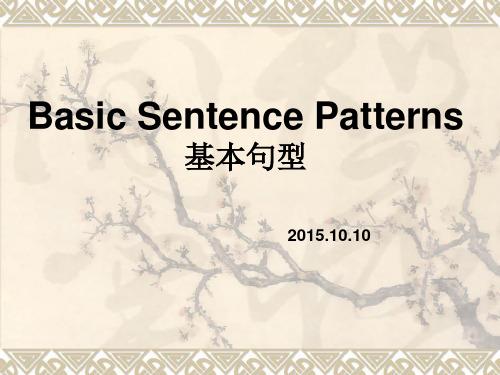
基本句型
2015.10.10
James
James is a football fan. He watches the World Cup every night. The games make him excited. However, the results always bring him sadness. His favorite team never wins.
Tips:
若要先说出直接宾语,后说间接宾语,则要借助与介词to 或for。 e.g. The onlookers told the police the whole story. → The onlookers told the whole story to the police.
James is a football fan. He watches the World Cup every night. The games make him excited. However, the results always bring him sadness. His favorite team never wins. 主语+不及物动词 Subject + Vi
Analyze the patterns of the following sentences.
Exercises to 1.1
11. The meeting lasted for two hours.
主语+谓语
12. He is repairing the generator.
主语+谓语+宾语
1.1
Exercises to 1.1
Basic+sentence+patterns+in+high+school+English

Object
The object is the person or thing that receives the
action of the subject
Example
"John reads books."
Subject+predict+predict
Subject
Predicte 1
The subject of a presence is the person or thing that performs the action
THANKS FOR WATCHING
感谢您的观看
Hale Waihona Puke composed of two or more simple sentences in parallel, each with an independent predicate.
Master subordinate compound sentence
composed of a main clause and one or more subordinate clauses, which need to be guided by a guide word and serve as an element of the main clause.
Example
"John is tall and plays basketball." (Subject: John, Predicte 1: is tall, Predicte 2: plays basketball)
CHAPTER 02
Compound presence
concept
A compound sentence is composed of two or more simple sentences connected by conjunctions, forming a complete sentence.
大学英语写作句型 修辞 sentences

Incomplete Sentences 残 缺 句
一般而言,英文句子的主语和谓语缺一不可。残缺句结构
不完整,实际上是将词当成句子或将从句当成句子。 例:I have visited many cities. For example, Beijing and Shanghai. 应改为:I have visited many cities,for example,Beijing
1. Travel will not only help us to gain knowledge of geography and history, but also help us keep healthy and make us less narrow-minded. 2. He who makes no mistakes, makes nothing.
(4) The Compound-complex sentence A compound-complex sentence contains at least two main clauses and at leastnation of a compound and a
III . Common Errors
Elements of a Sentence
The typical English sentence follows this pattern:
Subject + predicate
He is tall. / It is raining. Her sister is twenty years old. They have only one child. The old man takes a walk in the park every day.
Basic sentence structure
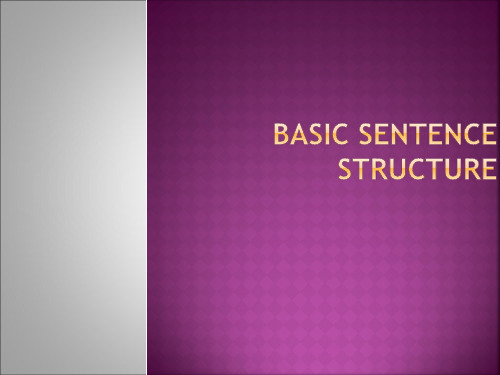
搭配:接动词原型。 例句:May I speak to Vincent?请问文森在吗? May I use your telephone? 我可以借用你的电话吗? May I have a seat? 我可以坐下吗?
please lower your voice? 请你小声点好吗? Would you please give me a hand? 请你帮我个忙好吗? Would you please finish the work first? 请你先把工作做完好吗? 搭配:加动词原型。 例句:Would you please tell me the truth? 请你告诉我真相好吗? Would you please keep the secret for me? 请你帮我保守秘密好吗? Would you please explain a little more clearly? 请你把事情解释清楚点好吗? 功能:用于向别人提出请求,十分礼貌。
常用句子:It is my great honor to speak to you today. 我很荣幸今天能在这说几句。 It is my great honor to be your friend. 我很荣幸成为你的朋友。 It is my great honor to introduce our new chairman. 我很荣幸地为大家介绍我们的新会长。 搭配:接动词(词组)原型。 例句:It is my great honor to have the opportunity to cooperate with you. 我很荣幸能有机会和你们合作。 It is my great honor to have you in my life. 我很荣幸今生有你相伴。 It is my great honor to be here on so special an occasion. 我很荣幸在这个特别的时刻来到这里。 功能:最常用于演讲开始的时候,是比较谦虚的说法。也用于 与新认识的工作搭档或朋友之间的寒暄。这个句型也可以说成 “I am honored to…”
大学英语语法之基本结构

不及物动词 lie (lay, lain, lying) e.g. The book is lying on the desk. rise (rose, risen, rising) e.g. Prices are rising.
shine (shone, shone, shining) e.g. I polished my shoes till they shone.
•SV和SVO结构
及物动词(transitive verb)与不及物动词 (intransitive verb) enjoy, ignore, complete (vt.) arrive, struggle, vanish (vi.) e.g. Suddenly the processtion stopped.(SV) The police stopped the procession.(SVO)
•SVA与SVOA结构
SV和SVO结构后跟有状语构成SVA与SVOA e.g. The sun has set. The sun set in the west. e.g. Has he taken a seat? Is he taking the chair out?
•几个词形相似容易混淆的动词
•SVOiOd结构
SVOiOd结构的语序 1. 间接宾语后移时,必须在它的前面加to, for等介词; e.g. Ann gave a beautiful doll to her daughter. Ann made a beautiful doll for her daughter. 2. 直接宾语为代词,必须紧跟在动词后面; e.g. The mother bought it for the girl. The mother bought it for her. 3. 少数动词只有一种语序 e.g. The repairman charged me ten dollars. The repairman charged ten dollars to my account.
- 1、下载文档前请自行甄别文档内容的完整性,平台不提供额外的编辑、内容补充、找答案等附加服务。
- 2、"仅部分预览"的文档,不可在线预览部分如存在完整性等问题,可反馈申请退款(可完整预览的文档不适用该条件!)。
- 3、如文档侵犯您的权益,请联系客服反馈,我们会尽快为您处理(人工客服工作时间:9:00-18:30)。
Basic Sentence PatternsI. Subject + Copula + Complement1. Subject + Copula + NounA friend to everybody is a friend to nobody. Tom was once a newspaper reporter.My children are a great comfort to me. She is no grammarian.Their is no easy task.Note:He is no scholar. = He is somewhat illiterate. He is not a scholar. = He is not such a person as a scholar.2. Subject + Copula + PronounThe cat climbing up the stairs is not yours; it's mine. It is something quite unusual.How much is it?3. Subject + Copula + Adjective (+ Prepositional Phrase)A) Subject + Copula + Adjective (+ Prepositional Phrase)My trip to France was most pleasant. Are you angry at my words?Our boss is quite content with his present position.B) Subject + Copula + Adjective beginning with ‘a’ (+ Prepositional Phrase)Miss Cathy and her sister are quite alike in appearance. He was not quite aware of the consequence of his decision. Note:The usual adjectives are:ablaze, abroad, adrift, aflame, afloat, afraid, alight, alive, alone, ashamed, asleep, awake等。
C) Subject + Copula + Adjective + of-Phrase) (1)Every time they meet us, they are full of complaints about something. He is careful of the rights of others.Note:The usual adjectives are:bare, capable, desirous, doubtful, fond, forgetful, free, guilty, ignorant, innocent, liberal, proud, quick, short, etc.D) Subject + Copula + Adjective + of-Phrase) (2)That's very thoughtful of your grandmother. It is very impolite of him to speak so loudly on such an occasion. Note:The usual adjectives are:careless, clever, considerate, cruel, foolish, good, kind, nice, right, rude, silly, stupid, unwise, wise, wrong, etc.Such adjectives as these are frequently used to describe the character or quality of people.4. Subject + Copula + -ing ParticipleThe situation is quite encouraging. What the speaker said was convincing to the listeners. The world of food can be more exciting than the world of fancy. My daughter's hobby is collecting stamps.What I like most is swimming in the sea. His main work is designing radio circuits.Note:The most commonly used –ing participles are:amusing, charming, encouraging, confusing, disappointing, discouraging, exciting, interesting, inviting, missing, misleading, obliging, pressing, promising, puzzling, refreshing, shocking, striking, surprising, etc..5. Subject + Copula + -ed ParticipleThe airport is well designed. Is your friend qualified for the post?Bicycles made in China are quite established in Africa. The new settlers are not yet accustomed to the weather here.Note:The most commonly used –ed participles are: upset, decided, delighted, devoted, disappointed, discouraged, distinguished, drunk, amused, astonished, offended, hurt, faded, frightened, amazed, married, excited, exhausted, experienced, inexperienced, interested, complicated, confused, contented, crowded, qualified, pleased, puzzled, reserved, satisfied, surprised, tired, worried, unexpected, unmarried, unprepared, unqualified, etc..6. Subject + Copula + Adjective + inf.(phrase)She is very reluctant to go with us. The whole family are anxious for you to come back soon.A good student is always curious to learn. The parents are willing for their daughter to marry Mr Jackson.7. Subject + Copula + Adjective Phrase + inf.(phrase)This radio is too large to go into my pocket. The boy was clever enough not to commit such a stupid mistake. Smith was so fortunate as to succeed.8. Subject + Copula + Adjective + Wh-word + inf.(phrase)The little child is not certain which to take. You must be careful how to handle the machine.9. Subject + Copula + Adjective + ClauseThe local people are determined that the project be completed in time.Their daughter was very happy that she had got the opportunity to go to university.The girl is still hesitant (about) what she should do next.10. Subject + Copula + AdverbThe light was still on when he returned. Their neighbor will take care of their house while they are away.The usual adverbs are:down, in, off, out, over, up等。
11. Subject + Copula + Prepositional PhraseMatter is in constant motion and in constant change. The responsibility is on our president's shoulder.The murderer is now under arrest.12. Subject + Copula + of-phraseJob seeking is of great interest to all the graduates. The two boys are (of) the same height.What the school master said at the meeting was of much importance. All the napkins are (of) the same colour.In the first two sentences abstract nouns are often used after of. More usages are: of no use, of great value, of some significance, of little assistance, of much help, of no interest, etc. And the prepositional phrase can be replaced by adjective equivalent:of great help = most helpful.In the second two sentences ‘the same’ is used before ‘of’, which is often omitted and the nouns are often used to express age, measurement, color, etc:the same age, the same weight, the same length, the same size, the same price, the same width, etc.13. Subject + Copula + inf. (phrase)Our approach to nature is to seek answers in experiment. The duty of a postman is to deliver letters and parcels. The only thing I can do is (to) convey your request. My intention is for you to learn as much vocabulary as possible.14. Subject + Copula + Wh-word + inf. (phrase)The trouble is how to find a new source of supply. The general's order was when and where to attack the enemy. His hesitation was whether to return or press ahead.15. Subject + Copula + ClauseHer impression is that he is in favour of the arrangement. That is why we decided to put the discussion off.What's troubling me is that I don't have much experience in this kind of work.It was almost as if everybody had come to know it. The world is no longer what it used to be.16. Subject + Semi-copula + ComplementTheir effort has proved to be a failure. The search for new materials remains a matter of considerable importance.A pencil in a glass of water will appear broken. Her excuse doesn't sound convincing.What has gone wrong with the recorder?The most commonly used semi-copulas are:become, come, fall, feel, get, grow, keep, lie, look, seem, smell, taste, turn, etc.II. Subject + Verb + (Adverbial)1. Subject + Intransitive Verb + (Adverbial)My watch has stopped. Heat, light, sound and electricity travel in waves. They talked face to face.She drives as carefully as her husband. He behaves as if he were the boss. This sort of cloth doesn't tear easily.Their products sell well on the European market.2. Subject + Intransitive Verb + (for) + ComplementHe walked for ten miles. The headmaster spoke for an hour. The river rose ten inches in the night.There are a great deal of verbs with this pattern, some of the most usual are: climb, come, drive, drop, fall, follow, grow, jump, march, move, ride, rise, run, sink, swim, walk, weigh, work.3. Subject + Intransitive Verb + inf. (phrase)I came to bury Caesar, not to praise him. The old woman sat in a corner so as not to be noticed by anybody.All the children laughed to see the clown stand on his hands. The young man seemed to have been fired by his boss.Bob arrived at the airport only to find the plane gone already.4. Subject + go-phraseSome teachers at our college go to church every Sunday morning. Helen went to office at half past eight yesterday.More examples of the usage: go to bed / college / hell / hospital / law / market / press / sea / school / town / war, etc.5. Subject + Intransitive Verb + Nominal AdverbialThe forests stretched (for) miles and miles. That pair of trousers will last me at least another year.The visitors have stayed in Hong Kong (for) a week.Usual verbs are:cost, fall, live, march, measure, rise, run, travel, wait, walk, weight, work, etc.6. Subject & Verb + so / notI think so. He hopes so. I am afraid so. I hope not. He is afraid not.Note:Frequently the patter is inverted;So I believe. So I’ve heard.The verbs in this pattern are: be afraid, believe, expect, hope, say, suppose, think, etc. But the verbs hear, notice, see can be used only with the inverted pattern (So I hear, etc.)7. Subject + Phrasal Verb + (Adverbial)Some of the rules are dying out gradually. The plane for Shanghai takes off at ten to six.Our material supplies will hold out for another month.8. there + be + Subject + (Adverbial)There is much truth in what you say. There have been many such incidents before in this area.There is no harm in trying. There may be some misunderstanding between you and me.9. there +be +no +-ing participle (phrase)There was no knowing when he would be back. There is no denying that he is a good leader.There is no mistaking what has been agreed upon.10. there +Phrasal Verb +Subject +(Adverbial)There happened to be a letter box at the corner of the street.There used to be many traffic accidents before the fly-way was built.11. there + Intransitive Verb +Subject + (Adverbial)There lies a big oil field beyond the hill. There runs a small river through the town.There remained the ruins of the building after the fire.Such intransitive verbs are:appear, arise, begin, come, emerge, exist, fall, follow, hang, land, live, occur, rise, sit, stand, etc.III. Subject + Verb + Object1. Subject + Transitive Verb + Noun / PronounThe theory bears examination. They have known each other very well.Anna cut herself in the kitchen this morning.2. Subject + Transitive Verb + Cognate NounI dreamt a curious, terrible dream last night. The girl smiled a very sweet smile to her boy friend.These old people are living a better life today.Such cognate nouns are:sleep a sound sleep, laugh a hearty laugh, die a heroic death, sing a merry song, fight a bloody fight, run a race, etc.3. Subject + Transitive Verb + Noun (derived from verb)I often take a hot bath in the evening. The earthquake has caused great damage and loss of life.The climbers had several rests on their way up the hill.The verbs with this pattern:do, have, give, make, take, etc.The most commonly used nouns derived from verb are: bath, breath, cry, damage, drive, effort, glance, look, nap, progress, rest, ride, share, smoke, stroll, talk, telephone call, try, walk, work, etc.4. Subject +have (got) + Noun + inf. (phrase)Our dean will have an important meeting to attend next week. The nurse has got five children to look after.The manager has a few official letters to be typed out.5. Subject + Intransitive Verb + Preposition + Noun / PronounThe town relied on the seasonal tourist industry for jobs. We must stick to the principle through thick and thin.The lawyer will look into the matter right away.6. Subject + Intransitive Verb + of + Noun / PronounHer parents did not approve of their marriage. Lately he has been complaining of insomnia and headache.The small village boast of an ancient church.We have some other such usages:admit of, dream of, judge of ,know of, read of, repent of, speak of, talk of, tell of, think of, write of, etc.7. Subject + Transitive Verb + Noun + Preposition + Noun / PronounMost students take an active part in sports. I'll pay a visit to an old friend of mine before I leave.We lost sight of him in the crowd.8. Subject + Transitive Verb + Adverb + NounThe operator didn't put through the passenger. When Mr Green retired his son took over the business from him. The university has turned out some first-rate scholars.9. Subject + Transitive Verb + Noun / pronoun + AdverbLet's take our raincoats off since it has stopped raining. If I get any further information, I will ring you up.This pattern is derived from the former. More verbs are:give up, lay down, make up, take in, take up, set up, etc.Note: When the object is a pronoun, the adverb is generally placed after the object:Please take them down.10. Subject + Intransitive Verb + Adverb + Preposition + Noun / PronounThey have been looking forward to increasing trade between the two countries.Is your salary keeping up with inflation? The law did away with slavery.11. Subject + Transitive Verb + inf. (phrase)From then on they began to take study more seriously. Would you care to go for a walk? They pretended not to see us.Some common verbs using this pattern are: begin, cease, commence, continue, dare, decide, expect, forget, have, hope, intend, learn, like, love, mean, need, offer, ought, prefer, pretend, promise, refuse, remember, start, swear, try, want, wish.12. Subject + Transitive Verb + Wh-word + inf. (phrase)We haven't decided whether to buy it or not. The little boy didn't know how to use the English word yet.She was wondering which to buy.The usual verbs taking this pattern are: ask, consider, decide, discover, enquire, explain, find out, forget, guess, know, learn, remember, see, settle, tell (=know), understand, wonder.13. Subject + Transitive Verb + -ing participlePeople prefer staying indoors on cold winter evenings. She is timid and always avoids being asked by the teacher.14. Subject + need / require / stand, etc. + -ing participleThe old-classroom needs white washing. These cheap novels cannot stand re-reading.15. Subject +do + -ing participleThe young couple do a lot of sightseeing every spring. Mother does the cooking and washing in the house.Foreign language students do much translating every week.16. Subject + Transitive Verb + Noun / Pronoun + -ing participle (phrase)I don't like young people behaving like that. Do you remember Jesse's coming to see you?She can't bear that friend of mine always making fun of her.17. Subject + Transitive Verb + ClauseCan you suggest where these books ought to be put?I am considering who should be assigned to do the work.The weather broadcast said that weather would get fine in the coming few days.18. Subject + Transitive Verb + (that) Noun ClauseHe said that they would come and see us.He intended that his son should inherit the business.I expect that you are surprised at the news.Usual verbs: acknowledge, admit, arrange, believe, can’t bear, confess, don’t care, declare, demand, deny, expect, explain, feat, hear, hope, imagine, intend, know, notice, propose, recommend, say, see, show, suggest, suppose, think, understand, wonder.IV. Subject + Verb + Indirect Object + Direct Object1. Subject + Transitive Verb + Noun / Pronoun + NounPlease bring me the journal next time you come.The sun sends us light and heat.My sister made her boy friend a shirt last summer.Mother cooked us a very rich dinner last Sunday.The most usual verbs with this pattern are: ask, bring, buy, cause, deny, do, envy, find, get, give, hand, leave, lend, make, order, owe, pass, pay, read, sell, send, show, spell, tell, throw, wish, write.2. Subject + Transitive Verb + Direct Object + Preposition + Prepositional ObjectI gave it to him.Please explain this to me.I will do the work for you.Excuse me for interrupting you.Tell me about your work.He threw a book at me.Compare your work with Henry’s.Some of the more common verbs with this patter are:(a)with to: award, add, bring, carry, compare, deny, fasten, fetch, give, hand, join, move, offer, owe, pass, pay, promise,read, refuse, sell, send, show, take, teach, tell, tie, write.(b)With for: bring, buy, choose, cook, do, fetch, forgive, get, leave, make, order, play, praise, punish, reach, save, write.(c)With about: ask, consult, question, re-assure, remind, tell, trouble, warn, worry, write.(d)With of: accuse, acquit, assure, clear, convince, deprive, ease, inform, persuade, relieve, remind, rid, rob, strip, suspect,tell.(e)With at: aim, hurl, point, shoot, throw.(f)With on: answer, make, read, spend, waste, write.(g)With with: compare, fill, mix, provide, supply.3. Subject + Transitive Verb + Noun / Pronoun + ClauseThis book will show us how science has developed.Would you please tell me which is the shortest way to the post office?A year's study has taught the students that they cannot master English without watching out for idiomatic usage.4. Subject + Transitive Verb + Preposition + Noun / Pronoun + clauseSome of the businessmen complained to the manufacturers that their packing needs improving.The criminal confessed to the priest when and how he had murdered the widow.I heard from Mr Johnson that the next flower show will be held sometime in May.The manager agreed with us that our price was most competitive.5. Subject + Transitive Verb + Noun / Pronoun + Wh-word + inf. (Phrase)We'd better ask the teacher whether to go on or to stop here.Our teacher will teach us how to write a business letter.V. Subject + Verb + Object + Object Complement1. Subject + Transitive Verb + Noun / Pronoun + NounThey made Newton President of the Royal Society.They appointed her head of English Department.We found the place a very good summer resort.The nouns used in this pattern:appoint, baptize, call, choose, christen, consider, crown, elect, entitle, find, make, name, nominate, proclaim, term, etc.2. Subject + Transitive Verb + Noun / Pronoun + as-phraseScientists use weight as a way of measuring mass.We usually take the earth's crust as firm and unmoving.The government considers the labour problem as solved.The verbs used in this pattern:accept, advance, choose, consider, class, define, describe, elect, hire, imagine, intend, know, recognize, regard, report, see, take, treat, use , etc.3. Subject + Transitive Verb + Noun / Pronoun + AdjectivePupils found this English poem interesting.The sun keeps the earth warm in winter.The cold wind has turned all the leaves yellow.The verbs used in this pattern:bake, bend, boil, break, burn, burst, colour, cut, crush, drive, dye, fill, find, get, have, heat, hold, keep, lay, leave, let, make, pack, paint, prove, pull, push, see, set, sleep, strike, turn, wash, wipe, wish, etc.4. Subject + Transitive Verb + Noun / Pronoun + AdverbThe mother often watches the children away.Jane didn't find her sister in when she called on her.The sick are usually kept indoor.5. Subject + Transitive Verb + Noun / Pronoun + Prepositional PhrasePeople considered the manufacturing process of great value at that time.Did you see all the students in high spirits then?News of victory set all of us at ease.Some other set phrases like this:in check, in custody, in hospital, in mind, on fire, on strike, out of work, under arrest, under construction, etc.6. Subject + Transitive Verb + Noun / Pronoun +(to be)+ Adjective (Complement)We consider it (to be) absolutely necessary.Dick's teacher thinks Dick (to be) the cleverest in the class.I guess you to be about twenty.They reported the enemy troops to be fifty miles away.‘to be’ in this pattern is often omitted after such verbs as: believe, choose, confess, consider, declare, elect, find, imagine, prefer, presume, prove, think.But ‘to be’in this pattern cannot be omitted after such verbs as:claim, discover, fancy, feel, guess, judge, know, like, observe, report, see, show, suppose, suspect, take, understand, want.7. Subject + Transitive Verb + Noun / Pronoun + inf.(phrase)The doctor advised me to have a good rest.I must warn you not to drive left in this country.I made him come.I heard him shout.The verbs with this pattern with ‘to’are chiefly: advise, allow, ask, can’t bear, beg, cause, choose, dare (=challenge), encourage, expect, force, get, hate, help, intend, invite, leave, like, love, mean (=intend), order, permit, persuade, prefer, remind, teach, tell, tempt, urge, want, warn, wich.The verbs with this pattern without ‘to’ are chiefly: bid, feel, have, gear, know, let, make, need, notice, see, watch.8. Subject + Intransitive Verb + Preposition + Noun / Pronoun + inf.(phrase)Mr Strong has sent for a doctor to examine the patient.The new comers looked upon themselves to be fully settled.Professor Smith asked for a young man to assist in his research work.The commonest verbs together with ‘for’ are:apply, arrange, ask, call, long, mean, need, plan, pray, prepare, provide, ring, send, telephone, vote, wait, want, etc.9. Subject + Transitive Verb + Noun / Pronoun + -ing participle(phrase)I smelt something burning in the kitchen.Many people watched the pickpocket being taken into the police office.He kept me waiting.Usual verbs: catch, feel, find, hear, imagine, keep, leave, listen to, look at, notice, see, set, smell, start, watch.10. Subject + Transitive Verb + Noun / Pronoun + -ed participle (phrase)Please have your blood tested in the next room.Where did you have the papers printed?I had a tooth filled yesterday afternoon.Beside ‘have’ or ‘get’, such verbs as ‘feel, find, hear, like, make, need, prefer, see, want, wish’ can be used with this pattern.11. Subject + Transitive Verb + Noun / Pronoun + ClauseI told him that he must work hard.He warned us that the road was a bad one.That experienced him that honesty is the best policy.I’ll remind you what I want you to do.Will you please inform us whose statue that is?Usual verbs; convince, inform, remind, satisfy, teach, tell, warn.。
